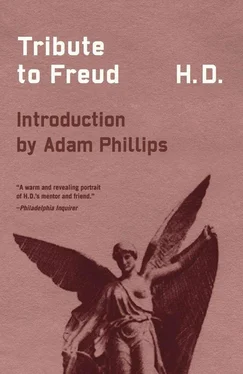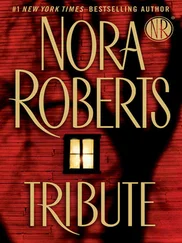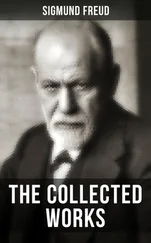There is the old-fashioned porcelain stove at the foot of the couch. My father had a stove of that sort in the outdoor office or study he had had built in the garden of my first home. There was a couch there, too, and a rug folded at the foot. It too had a slightly elevated head-piece. My father’s study was lined with books, as this room was. There was a smell of leather, the crackling of wood in the stove, as here. There was one picture, a photograph of Rembrandt’s Dissection, and a skull on the top of my father’s highest set of shelves. There was a white owl under a bell-jar. I could sit on the floor with a doll or a folder of paper dolls, but I must not speak to him when he was writing at his table. What he was “writing” was rows and rows of numbers, but I could then scarcely distinguish the shape of a number from a letter, or know which was which. I must not speak to my father when he lay stretched out on the couch, because he worked at night and so must not be disturbed when he lay down on the couch and closed his eyes by day. But now it is I who am lying on the couch in the room lined with books.
But no, there are not many books in this room; it is the other room that is lined with books. The window in this room and the one in the other room look out on to a courtyard, I believe. I am not sure of this. It is quiet here, anyway. There is no sound of traffic from the street, no familiar household sounds as from the Freud-family side of the house. We are quite alone here in this room. But there are two rooms really, though the room beyond is almost part of this room with the wide-parted double doors. There is dusk and darkness beyond, through the parted double doors to the right of the stove, as I lie here. There is the door across the room that opens in from the little waiting room. There is the other door, at right angles, the exit door. It leads through a rather dark passage or a little room that suggests a pantry or laboratory. Then there is the hall beyond it, where we hang our coats on pegs that somehow suggest school or college. The Flying Dutchman has been and gone. Not only are we alike in our relation to the Professor, as seekers or “students” as he calls us, but we bear the same relation to the couch that I am lying on. When, in the beginning, I expressed a slight embarrassment at being “almost too tall,” the Professor put me at ease by saying that the analysand who preceded me was “actually considerably taller.”
My brother is considerably taller. I am five and he is seven, or I am three and he is five. It is summer. The grass is somewhat dry, a few leaves crackle under our feet. They have fallen from a pear tree that has large russet pears. The pears have been gathered. ( Pears? Pairs ?) There is a tree opposite this, that has small yellow pears; they ripen earlier. The tree next our tree is a crab-apple tree and there is a slice of a large log under it. The log is like a round table or a solid thick stool. It is too heavy for us to move, but Eric, our half-brother (a grown man to us), shifted it easily. We saw what was under the heavy immovable log. There was a variety of entertaining exhibits; small things like ants moved very quickly; they raced frantically around but always returned to the same ridge of damp earth or tiny lump of loam. In neatly sliced runnels, some white, wingless creatures lay curled. The base of the log had been the roof of a series of little pockets or neat open graves, rather like Aztec or Egyptian burial-chambers, but I did not know that. These curled, white slugs were unborn things. They were repulsive enough, like unlanced boils. Or it is possible that they were not essentially repulsive — they might be cocoonless larvae, they might “hatch” sometime. But I only saw them, I did not know what they were or what they might portend. My brother and I stood spellbound before this disclosure. Eric watched the frantic circling of the ants attentively. Then he set the log back carefully, so as to crush as few of the beasts as possible, so as to restore, if possible, the protective roof over the heads of the white slugs.
There were things under things, as well as things inside things.
But that was another occasion. This time, I am alone with my brother, who is considerably taller. He had summoned me. He had a strip of newspaper in his hand. He had a magnifying glass that he must actually have taken from our father’s table. He told me to look and I saw the print on the flimsy news-sheet grown larger, but I knew the glass did this. I did not know why he had to show me this news-print. I did not read. If he wanted to show me something, it should be something more attractive, more suitable altogether. “Don’t go away,” he said, “it will happen in a minute.” The sun was hot on our backs. The pear branch cast its late-summer shadow toward the crab-apple tree. “Now,” he said. Under the glass, on the paper, a dark spot appeared; almost instantaneously the newspaper burst into flames.
It was inevitable that a tall, bearded figure should appear from the Ark-like door of the outdoor study. The study was not flat on the ground but set on a series of square stone pillar-like foundations. Our father came down the steps. This picture could be found in an old collection of Bible illustrations or thumbed-over discarded reproductions of, say, the early nineteenth-century French painter, David. It is a period piece, certainly. Yet its prototype can be found engraved on Graeco-Roman medallions or outlined against the red or black background of jars or amphorae of the classic Greek period. I have said that from my reclining yet propped-up, somewhat Madame Récamier-like position on the couch, I face the wide-open double door. At the foot of the couch is the stove. Placed next the stove is the cabinet that contains the more delicate glass jars and the variously shaped bottles and Aegean vases. In the wall space, on the other side of the double door, is another case or cabinet of curiosities and antiques; on top of this case there are busts of bearded figures — Euripides? Socrates? Sophocles, certainly. There is the window now as you turn that corner, at right angles to this cabinet, and then another case that contains pottery figures and some more Greek-figure bowls. Then, the door to the waiting room. At right angles again, there is the door that leads through the laboratory-like cupboard-room or alcove, to the hall. These two last doors, the entrance door and the exit door, as I call them, are shut. The wall with the exit door is behind my head, and seated against that wall, tucked into the corner, in the three-sided niche made by the two walls and the back of the couch, is the Professor. He will sit there quietly, like an old owl in a tree. He will say nothing at all or he will lean forward and talk about something that is apparently unrelated to the progression or unfolding of our actual dream-content or thought association. He will shoot out an arm, sometimes somewhat alarmingly, to stress a point. Or he will, always making an “occasion” of it, get up and say, “Ah — now — we must celebrate this,” and proceed to the elaborate ritual — selecting, lighting — until finally he seats himself again, while from the niche rises the smoke of burnt incense, the smoldering of his mellow, fragrant cigar.
Length, breadth, thickness, the shape, the scent, the feel of things. The actuality of the present, its bearing on the past, their bearing on the future. Past, present, future, these three — but there is another time-element, popularly called the fourth-dimensional. The room has four sides. There are four seasons to a year. This fourth dimension, though it appears variously disguised and under different subtitles, described and elaborately tabulated in the Professor’s volumes — and still more elaborately detailed in the compilations of his followers, disciples, and pseudo-disciples and imitators — is yet very simple. It is as simple and inevitable in the building of time-sequence as the fourth wall to a room. If we alter our course around this very room where I have been talking with the Professor, and start with the wall to my left, against which the couch is placed, and go counter-clockwise, we may number the Professor’s wall with the exit door 2, the wail with the entrance door (the case of pottery images and flat Greek bowls) 3, and the wall opposite the couch 4. This wall actually is largely unwalled, as the space there is left vacant by the wide-open double doors.
Читать дальше











